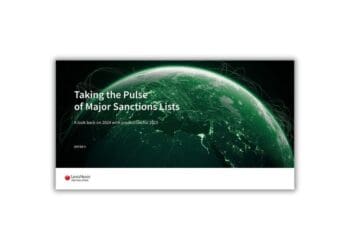Clifford Chance’s Wendy Wysong and Nick Turner discuss the sanctions risks looming in Hong Kong and what companies operating there can do to protect themselves.
with co-author Nick Turner
The Financial Action Task Force (FATF) issued its much-anticipated Mutual Evaluation Report (MER) of Hong Kong on September 4, 2019. Among its recommendations, the MER encouraged Hong Kong to closely monitor its exposure to proliferation financing, especially from North Korea. It is the latest reminder that there are sanctions risks lurking under Hong Kong’s compliant surface that are bigger than you might think.
Front and Center
The well-known simplicity of company formation in Hong Kong has made the Special Administrative Region (SAR) a favorite destination for front companies working on behalf of marginalized governments and their supporters — Iran, North Korea and Venezuela included — as demonstrated by three recent actions from the U.S. Treasury Department’s Office of Foreign Assets Control (OFAC).
On August 28, 2019, OFAC named a company in Hong Kong as a specially designated national (SDN) under Executive Order 13382 for being connected to a procurement network acting on behalf of Iranian military organizations. According to OFAC, the company, Green Industries (Hong Kong) Limited, was used to purchase export-controlled equipment from U.S. suppliers intended for SDN Iranian entities with involvement in weapons of mass destruction (WMD) proliferation.
Later that week, OFAC designated Hong Kong and Taiwan-based Jui Cheng Shipping Company Limited; its vessel, the Shang Yuan Boa; and two of the company’s executives as SDNs under Executive Order 13810 for engaging in ship-to-ship transfers of petroleum products to North Korean vessels in breach of United Nations sanctions. In recent years, OFAC has designated numerous individuals and entities in China, Hong Kong, Singapore and Taiwan for engaging in prohibited and non-transparent North Korean trade.
One month earlier, OFAC added Hong Kong-headquartered Group Grand Limited to the SDN list pursuant to Executive Order 13692 for its role in a vast corruption scheme benefitting associates of Nicolás Maduro. According to OFAC, Group Grand was the linchpin in a global network of front companies stretching from Hong Kong to Dubai to Mexico that siphoned money from a government-run food program in Venezuela. The perpetrators allegedly engaged in trade-based money laundering, invoice fraud and other crimes to generate corrupt proceeds through the international financial system.
Under the Microscope
A fourth Hong Kong front company was the focus of a high-profile court battle involving three Chinese banks it used to gain access to the U.S. financial system, reportedly to facilitate North Korea’s WMD program. Ultimately, the U.S. Court of Appeals for the District of Columbia affirmed court orders requiring the three Chinese banks to comply with subpoenas seeking information on their Hong-Kong-based customer and holding the banks in contempt for failing to comply with that order under a $50,000-per-day penalty.
The Court of Appeals found that two of the banks had submitted to U.S. jurisdiction by opening branches in the United States. The third bank, which maintained a correspondent account in the United States, was subject to jurisdiction under the USA PATRIOT Act, which authorizes subpoenas for information held outside the United States in relation to U.S.-based correspondent accounts.
While the U.S. government has not accused the banks of any wrongdoing, the banks resisted the subpoenas to avoid breaking Chinese bank secrecy rules, which prohibit them from disclosing information without the PRC government’s permission. The Court found that the U.S. Department of Justice was not required to use the U.S.-China Mutual Legal Assistance Agreement (MLAA) for obtaining such permission, since the U.S. government had demonstrated its futility. The final outcome of the case is still pending.
Human Rights and Democracy
Also of note, the United States is considering sanctions and visa bans against individuals responsible for the “surveillance, abduction, detention, abuse or forced confession” of certain Hong Kong individuals or the rendition of individuals to Mainland China “in connection with the exercise … of internationally recognized human rights in Hong Kong.” The bipartisan Hong Kong Human Rights and Democracy Act 2019 specifically references the proposed (and now withdrawn) extradition bill that sparked this summer’s months-long protest movement.
Realistically, even if the Act is passed, it might never be used. Nevertheless, the Act symbolizes Congress’ recognition that Hong Kong sanctions could be used to influence Beijing in light of ongoing trade tensions. The SAR’s role in the international financial system — especially capital markets — will make sanctions an attractive tool for a long time to come. Add that to the list of risks simmering just above the surface.
Compliance Culture
What can Hong Kong companies do to protect themselves?
The good news is that the same factors that make Hong Kong a sanctions hot spot also equip it to deal with those risks. FATF’s MER pointed out that Hong Kong attracts talent. The SAR has a large number of skilled practitioners working in multinational banks, consultancies and law firms who live and breathe compliance.
Companies that are concerned about unwittingly abetting illicit activity must implement risk-based controls for due diligence and transaction monitoring to detect SDNs and others who may be engaged in sanctions evasion or high-risk activities. Certain areas — for example, trade finance, petroleum and shipping — are inherently higher risk and require greater attention.



 Wendy L. Wysong is a partner at
Wendy L. Wysong is a partner at 







